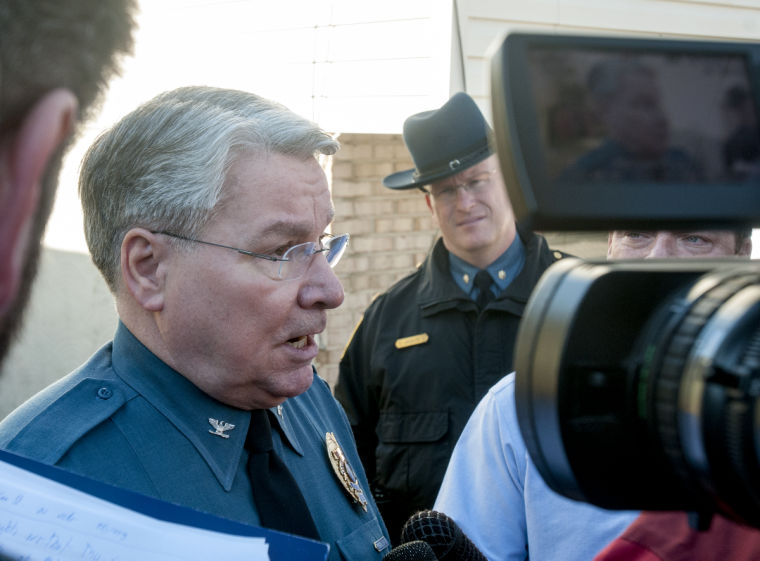
David Mitchell, University of Maryland Police chief, speaks to reporters the day of the Feb. 12, 2013, off-campus murder-suicide.
EDITOR’S NOTE: An individual in this story spoke on the condition that his name be withheld.
As University Police work toward expanding their reach off the campus, officials are beginning to brainstorm how they’ll secure funding to put more feet on the ground in the midst of a financial crunch.
Police and the Office of Student Conduct have separately been in talks for months to increase each department’s jurisdiction in the university community. However, the urgency of those measures was reaffirmed Tuesday after a recent string of crime was followed by a murder-suicide that left two students dead and one injured. University Police hope to gain approval from Prince George’s County Police so they can patrol beyond Paint Branch Drive, spokesman Maj. Marc Limansky said, but the department has a shortage of funds to pay for increased patrols.
“Really the issue is, can we get money for staffing and vehicle resources?” he said. “If we had staffing and equipment, I think we could handle more patrol in the city.”
At last week’s College Park City Council meeting, state Sen. Jim Rosapepe (D-Prince George’s and Anne Arundel) suggested the city and university pursue grants from the state to pay for these added measures. But as an alternative, he said, business and property owners in designated areas of the city could pay an extra tax to cover the cost of new safety measures, such as additional security cameras.
Because students are generally renters in the city, the tax would not directly impact them unless business and property owners increased their prices.
“It’s not a question of students paying extra; it’s a question of property owners paying extra,” Rosapepe said. “The students would be the beneficiaries of this action.”
However, one Route 1 business owner said his support for an extra tax would depend largely on how the department would use the money.
“We’ve had our fair share of run-ins with students,” said the owner, who spoke on the condition of anonymity. “If we call University Police, they tell us ‘You’re out of our jurisdiction’ … but honestly, I’d rather call them than PGPD.”
Additionally, University Police are already funded by the state, he said.
“I feel like we’ve already paid that bill,” he said.
Tyler Blake, a sophomore biochemistry major, said he didn’t think additional enforcement powers were necessary.
“I wouldn’t want to pay extra because I’ve never felt unsafe walking around,” Blake said.
The Office of Student Conduct is also seeking greater authority to sanction students off the campus, something it can only do now if a student is convicted of a criminal offense that would both violate the Code of Student Conduct and “pose a threat to the stability of the campus or campus community.”
Such offenses include rioting, assault, hazing and theft. An expansion would give the office jurisdiction for cases of disorderly conduct and public drunkenness, among other violations, university President Wallace Loh said.
“There are certain things that students are not supposed to do, like drinking in excess in public. You do that on campus, there are certain sanctions,” Loh said. “But you do those same things, like you are urinating in public, or disorderly conduct, you’re throwing beer bottles around. You do that outside the boundaries of the campus right now, the student judicial code does not apply.”
Tuesday’s shooting strengthened the need to give students another place to turn if they wish to report concerns without involving police, Student Conduct Director Andrea Goodwin said. By April, the University Senate’s Student Conduct Committee will present recommendations on Goodwin’s proposal to expand the office’s jurisdiction, a change that would apply only to areas considered a part of the university community.
“We’re not talking about students going to Mexico and violating the liquor laws,” Goodwin said.
If the measure passes, it will go into effect for the upcoming school year, she said.
University Police are also in favor of the action, as it would add another avenue for officers to take in responding to misdemeanors.
“From a police standpoint, adding that ability [to refer students] is a valuable resource,” Limansky said. “I think this is going to have a bigger impact on student behavior than [the fear of] getting a criminal citation or getting arrested.”



